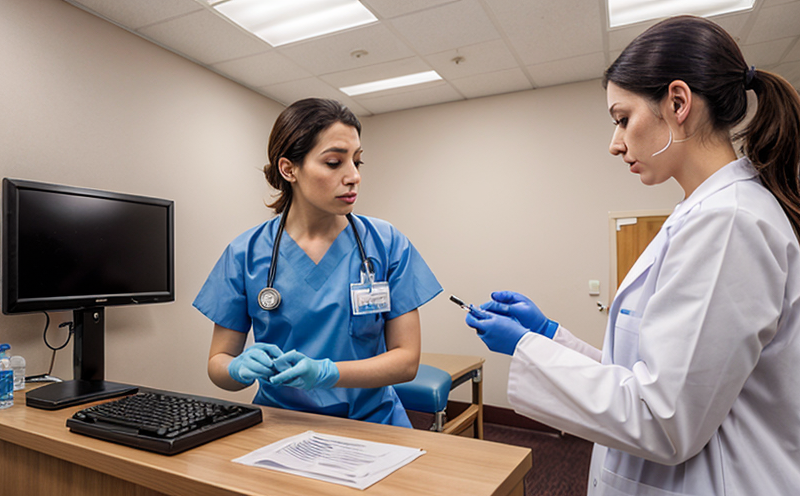Ergot Alkaloid Testing in Grain and Pasture Grass
The ergot alkaloids, a diverse group of compounds produced by fungi such as Claviceps purpurea, pose significant risks to human health when present in grain and pasture grass. These toxins can lead to diseases like ergotism (also known as St. Anthony's Fire), which affects the nervous system, cardiovascular system, and reproductive organs.
Ergot alkaloid testing is crucial for ensuring the safety of agricultural products destined for human consumption or animal feed. The presence of these compounds in grain and pasture grass can have severe health implications for both humans and livestock. In this service, we provide comprehensive analysis to detect and quantify ergot alkaloids, including ergonovine, ergotoxine, ergocornine, and others.
Our testing method adheres strictly to international standards such as ISO 13945:2016 for the extraction process and detection using LC-MS/MS (Liquid Chromatography Tandem Mass Spectrometry). This advanced technique ensures accurate quantification even at trace levels, allowing us to provide reliable results that meet regulatory requirements.
The testing procedure involves several steps:
- Sample collection: Fresh or stored grain and pasture grass samples are collected from various locations within the field or storage facility.
- Pretreatment: The samples undergo rigorous pretreatment processes including milling, sieving, and extraction using appropriate solvents. This step ensures that all ergot alkaloids are released for analysis.
- Analysis: Using LC-MS/MS technology, we analyze the extracted samples to identify the presence and concentration of ergot alkaloids.
The results from our testing can be used by various stakeholders:
- Quality Managers: To ensure that products meet safety standards set by regulatory bodies like EU regulations or Codex Alimentarius.
- Compliance Officers: To verify compliance with international trade agreements and local laws regarding food safety.
- R&D Engineers: To understand the impact of ergot alkaloids on livestock health, which can inform breeding programs and feed formulation strategies.
- Procurement: To make informed decisions about sourcing safe and reliable agricultural products for further processing or direct sale to consumers.
Our commitment to accuracy and precision is reflected in the meticulous nature of our testing process. We ensure that every sample undergoes thorough analysis, providing clients with confidence in their product safety.
| Sample Type | Target Alkaloids Detected | Regulatory Compliance |
|---|---|---|
| Grain Samples | Ergonovine, Ergotoxine, Ergocornine | EU Regulation 397/2010 |
| Pasture Grass Samples | Ergotamine, Gliostreptomycin, Tenuazonic Acid | Codex Alimentarius |
The data in this table highlights the specific ergot alkaloids that can be detected and the relevant regulatory frameworks governing their presence in different samples.
Quality and Reliability Assurance
We maintain a robust quality management system that ensures consistent accuracy and reliability in all our tests. Our laboratory is certified to ISO/IEC 17025, which guarantees adherence to international standards for testing and calibration laboratories.
To further enhance the precision of our results, we employ state-of-the-art instrumentation such as LC-MS/MS, coupled with experienced technicians who have undergone rigorous training. Regular internal audits and external proficiency tests are conducted to verify the accuracy and reliability of our findings.
The reliability of our testing is also supported by our commitment to ongoing research and development. We stay updated with the latest scientific advancements in ergot alkaloid detection, ensuring that we use cutting-edge technology and methodologies.
Use Cases and Application Examples
Ergot Alkaloid Testing plays a pivotal role in various sectors including agriculture, food production, and livestock management. Here are some specific examples:
| Use Case | Description |
|---|---|
| Agricultural Production | Detecting ergot alkaloids helps farmers identify infected crops early, allowing for timely interventions such as harvesting or disposal. |
| Food Processing | Testing ensures that processed foods meet stringent safety standards and do not contain harmful levels of toxins. |
| Livestock Feed Manufacturing | Evaluating feed samples helps manufacturers ensure the health and well-being of livestock by minimizing exposure to toxic compounds. |
| International Trade | Compliance with international trade agreements is ensured, allowing for seamless export and import processes. |
| Research and Development | R&D teams can use the results of this testing to develop safer agricultural practices and improve crop resilience against fungal infections. |
| Consumer Protection | The public is protected from potential health risks associated with consuming contaminated products. |
Ergot Alkaloid Testing is essential in ensuring the safety of agricultural products. It supports a wide range of stakeholders, from farmers and processors to regulatory authorities and consumers.





